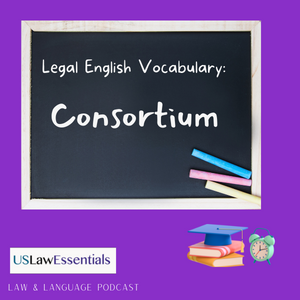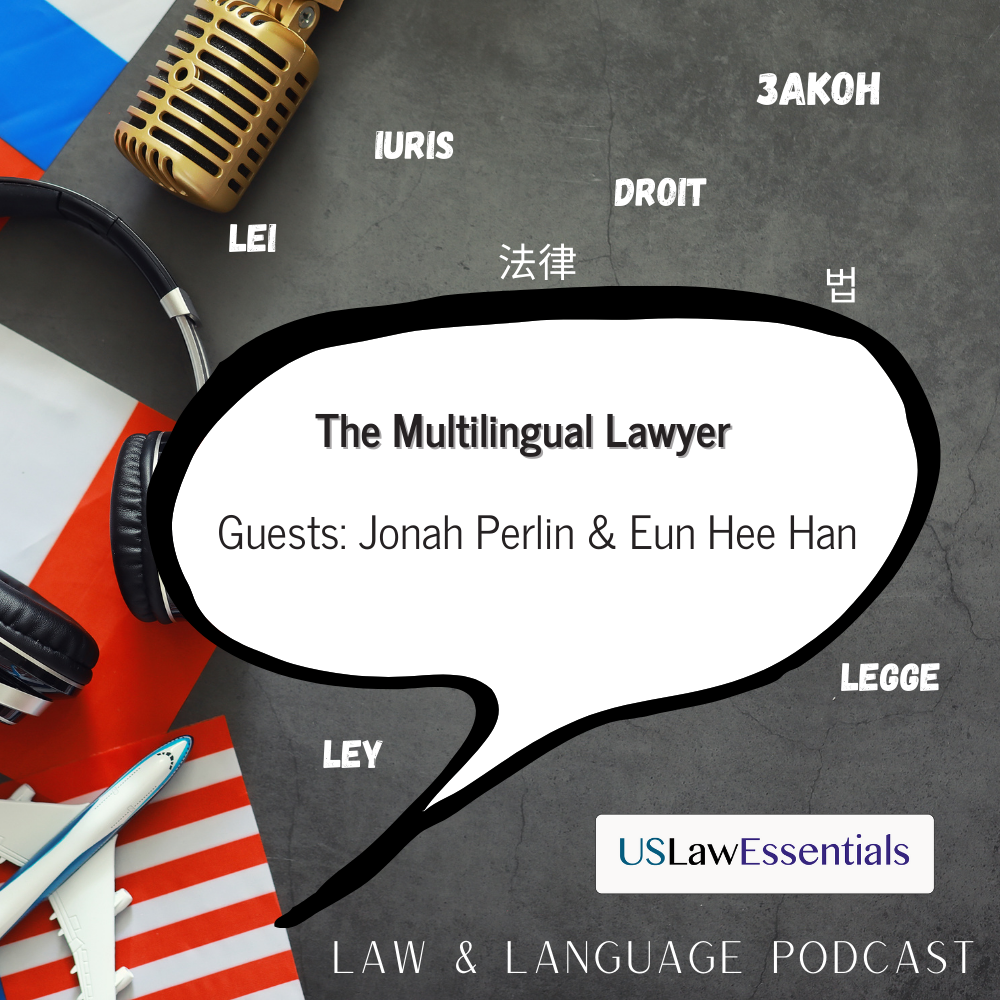Speaker 0 00:00:00 Oh, you know, and if you change the pronunciation of the word, if you change the, uh, the, the emphasis and you make it produce, it has a completely different meaning
Speaker 1 00:00:09 Produce. That means like you're, you're for deuce. If you're not anti-D deuce, you're
Speaker 0 00:00:18 Welcome to the US Los Centrals Law and Language Podcast, the legal English podcast for non-native English speakers to help you improve your English listening, improve your legal English vocabulary, and build your knowledge of American legal culture. Hi, this is Daniel. And before we begin today's episode, I wanna remind you that US Law Essentials offers online courses in legal, English and US law. Our courses are designed for international attorneys, law students, and translators. If you have any questions, please contact Daniel
[email protected], and join us on Facebook and on LinkedIn. And now today's episode,
Speaker 1 00:01:06 Welcome to the US Law Essentials Law and Language Podcast. I'm Steven Horowitz.
Speaker 0 00:01:12 And I'm Daniel Edelson.
Speaker 1 00:01:14 And today we have another edition of Legal English vocabulary. Today it's Dan's turn to pick a word. Dan, what did you pick for us?
Speaker 0 00:01:24 Well, I picked a word that has both a regular meaning and a legal English meaning, and the word is produce,
Speaker 1 00:01:33 Produce, like
Speaker 0 00:01:35 P r o d u c e
Speaker 1 00:01:37 P r o d u c E. Like to make something
Speaker 0 00:01:40 It is like to make something, but, but produce has a number of different meanings. And one meaning is exactly like what you're saying. Like where a company manufactures something, we would say, oh, for example, Toyota produces cars. But, um, produce can have other meanings too. Do you know another like non-legal meaning of produce?
Speaker 1 00:02:03 Yeah, like, um, in the movies in Hollywood, they talk about somebody produces a movie or is the producer for a movie.
Speaker 0 00:02:11 Oh, that's right. That's right. So it, it, and that can be sometimes someone who's just financially backing it or actually someone who's working in causing something to be created. Yeah,
Speaker 1 00:02:22 It's like there's, I sometimes I think of the producer as like the, the project manager for the whole movie. So they're making the movie, I mean, a little bit different than the director, but they're making the movie, essentially.
Speaker 0 00:02:34 Yeah. And I, we could say that you and I are producing a podcast episode even as we speak. Yeah.
Speaker 1 00:02:40 Right. Well, and then after we make this, we do this talking and recording, then you go back and you produce the episode. You, you, you organize the recording and make it into a forum that we can listen to as a podcast. You've produced it.
Speaker 0 00:02:56 Excellent. Okay. Oh, you know, and if you change the pronunciation of the word, if you change the, uh, the, the emphasis and you make it produce, it has a completely different meaning
Speaker 1 00:03:05 Produce. That means like, you're, you're for deuce. You're not anti-D deuce, you're produ.
Speaker 0 00:03:13 No, that's completely wrong. But that, that's great. I suppose like being pro bono or anti bono produce, like, uh, you probably encourage your children to eat produce, but you don't call it produce when you tell your children to eat it
Speaker 1 00:03:24 Vegetables, right. Things that come
Speaker 0 00:03:26 Outta the Yeah, yeah.
Speaker 1 00:03:27 And vegetables ass produce in like the grocery store.
Speaker 0 00:03:31 So we've got these different meanings of produce. We've got that produce, but there's also the legal English meaning, which can be a little bit confusing. And that's when during a litigation, one party produces documents.
Speaker 1 00:03:51 Oh, like they have to write documents. Right. They're producing documents.
Speaker 0 00:03:56 That's the thing. It's completely different from that. So one side requests that the other side produce documents and the other side will produce those documents, but they're not writing the documents. They're not creating the documents. They're actually just turning the documents over to the other side. They're sharing the documents.
Speaker 1 00:04:21 So for example, if you, if you sue me and we are getting ready for a trial, so we're in pretrial preparation, um, and we're going through the discovery process where there's a part where you get to ask for anything that I might have and I get to ask for anything that you might have. And, and especially if we're both companies, there's probably a lot of documents. So I have to give you all the documents that you ask for.
Speaker 0 00:04:50 Well, you don't necessarily have to give me all the documents that I ask for, but you probably have to give me a lot of the documents that concern our litigation. So for example, let's say I'm suing you for, uh, committing a fraud. I might ask you to produce emails concerning our transaction. So I could see if you were secretly plotting to trick me.
Speaker 1 00:05:18 So that would be, if you asked me to produce all of my emails related to the transaction, you would definitely not want me to start. It doesn't mean Steven go write some new emails that show that you tricked, that that show that you tricked Dan. Right. You want me to give emails that I've already written?
Speaker 0 00:05:37 That's exactly right, Steven. In fact, if you were to go ahead and be sneaky and to actually start creating documents that tried to put, tried that, tried to show that you were somehow really innocent, you could get in a lot of trouble. So you wouldn't be creating those emails, you'd be turning over the emails that already exist.
Speaker 1 00:05:59 Okay. So if I'm a young lawyer at a big law firm that's working on a big litigation or a big lawsuit, um, and, and, uh, a senior partner tells me, Steven, we need you to work on document production this weekend. That means I'm gonna spend my whole weekend going through lots of documents on the computer, figuring out which ones are relevant and which ones we have to give to the other side.
Speaker 0 00:06:29 There's a whole industry that's built around this to make the process a little bit more organized and systematic.
Speaker 1 00:06:39 Yeah. Because in, in the older, I don't wanna say the old days, but in the older days, um, this would mean one, one associate or or multiple young associates sitting around going through physical documents. And now these document production companies, I think do it all with software and, and maybe even artificial intelligence that can read the documents and start organizing and categorizing things before human eyes are even before, before human eyes even have to look at them.
Speaker 0 00:07:11 Yeah. That's, that, that's exactly right. There's also been a lot of litigation concerning the steps that parties take to collect and produce documents during a civil litigation. So it's a, it's a pretty big issue.
Speaker 1 00:07:27 So this sounds like a, the whole process of this, there's a lot of people involved, there's a lot of things to manage. It sounds like a big production to produce all these documents.
Speaker 0 00:07:39 It's a paper <laugh>.
Speaker 1 00:07:41 It's almost like if I was in charge of it, you might call me the, the document production producer.
Speaker 0 00:07:49 I would almost call you that, but then I would catch myself and say, that sounds, that sounds a little bit silly. But after a long weekend of reviewing documents, you start to feel like produce
Speaker 1 00:08:03 <laugh>. You're just sort of vegetating there as your brain gets tired from looking at a lot of all these documents over and over and over again. Okay, Dan, well thanks so much. This, this has been a, a great discussion of the word produce and production. Um, now that we're done with the discussion, maybe you should get busy working on the production of this podcast.
Speaker 0 00:08:25 Right. And I'm looking forward to my podcast review. Stay essential.
Speaker 1 00:08:29 Stay essential, Dan.


